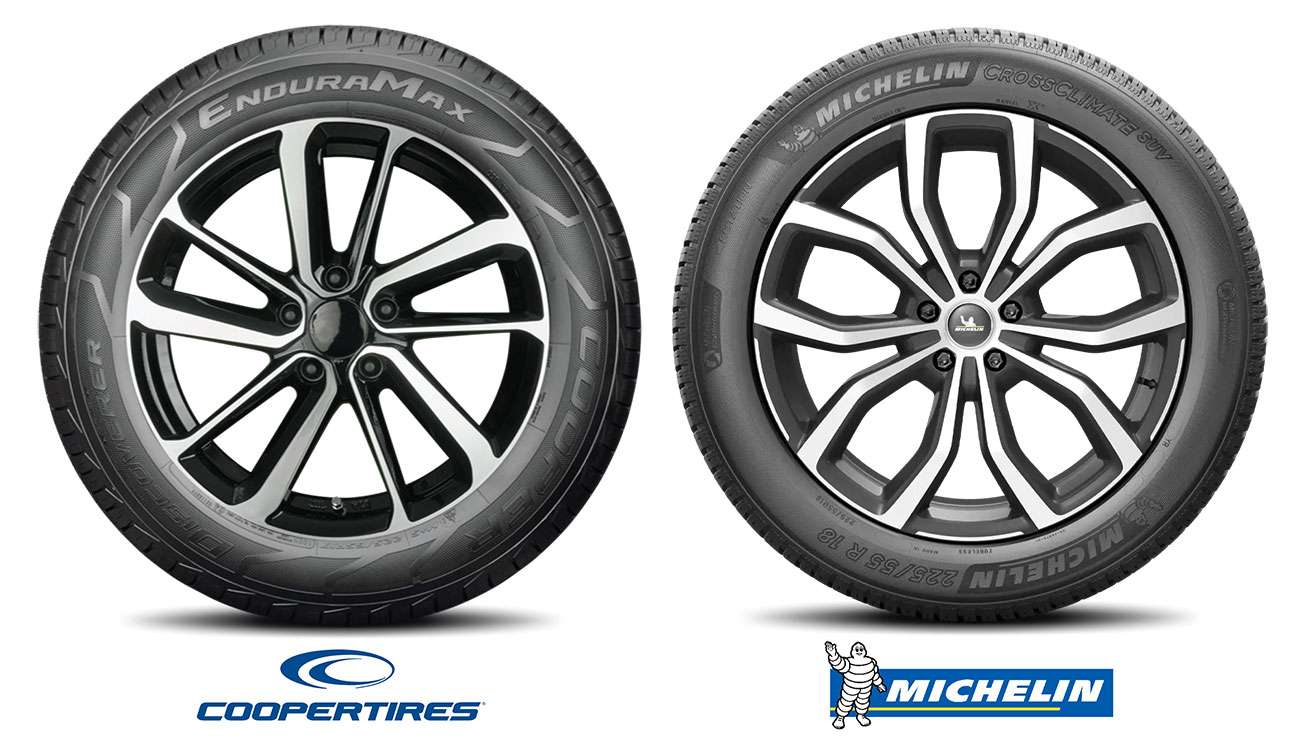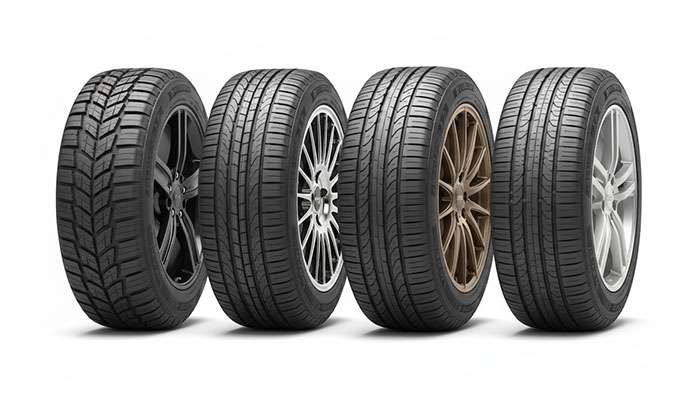
The choice between Cooper vs Michelin puts drivers at a crossroads of value and premium performance. Michelin's tires have earned 93 J.D. Power awards. That's four times more than all their competitors put together, making them the world's most valued tire brand. Cooper Tire & Rubber Company brings 100+ years of American manufacturing expertise and focuses on making durable tires at better price points.
These tire giants have carved their own paths in the market. Michelin started in France in 1889 and stands out with exceptional life span, better technology, and great traction. Cooper tires, 109 years old, shine with their toughness and resilience. Their reinforced sidewalls and durable rubber compounds handle rough roads well[-3]. Michelin's premium price tag comes from advanced engineering and top-quality materials. Cooper tires are substantially more affordable, which makes them a hit with budget-conscious buyers.
The contrast shows up clearly in specific models. Michelin's Defender 2 comes with an 80,000-mile warranty. The Cooper CS5 Ultra Touring offers 70,000 miles. On top of that, Cooper tires last between 45,000-65,000 miles based on model and driving conditions. Both brands deliver solid performance despite the price difference. Many drivers ask themselves: do Cooper tires match up to Michelin for their specific driving needs?
This piece will get into the main differences between these respected manufacturers. You'll learn which tire brand best suits your vehicle, driving style, and budget needs.

Cooper and Michelin follow two distinct philosophies when manufacturing tires[link_1]. Cooper, a 109-year-old company, built its reputation on "The Cooper Way"—a standard of beliefs that guides every business decision. This American manufacturer delivers outstanding traction and handling under challenging conditions, particularly for truck and SUV owners.
Michelin's story began in 1889, showcasing European engineering precision. The French company combines 200 different components and materials in their tire designs and draws expertise from 350 different technical fields. Their products excel in highway performance, tread life longevity, and fuel efficiency through minimal rolling resistance.
Cooper's design strategy showcases aggressive tread patterns that work best off-road. The company's tires offer better grip in wet and snowy conditions through advanced siping. The Discoverer series particularly stands out for its robust durability.
Michelin puts €1.2 billion yearly into state-of-the-art research. This investment yields symmetrical tread patterns that minimize rolling resistance and boost fuel economy. The company's participation in endurance racing has proven its tire's superior lifespan and performance.
These manufacturers remain dedicated to advancement through different paths—Cooper focuses on practical durability while Michelin emphasizes technological progress and sustainability.

Tests show key differences in how these tire giants perform in real-life conditions. Michelin stands out on highways and provides a smooth, quiet ride with minimal road noise. The company's tires use advanced tread designs with variable blocks and sound-absorbing technology that create a comfortable driving experience.
Cooper excels in off-road performance. Their Discoverer line grips well on dirt, gravel, and mud. The tires work well on highways but generate more noise, especially with their aggressive off-road models.
Michelin's warranties extend to 80,000 miles while Cooper caps at 65,000 miles. Premium materials in Michelin tires result in slower tread wear and deliver better value over time. Independent tests also confirm Michelin's rubber compounds provide superior wet traction and better fuel efficiency.
The brands show distinct differences in weather handling. Michelin's advanced siping and specialized compounds make it superior in wet and winter conditions. The CrossClimate models earn high praise for all-season performance. Cooper makes reliable winter options in their Evolution line but falls short of Michelin's extreme winter capabilities.
You can find Cooper Tires for off-road adventures or Michelin Tires for premium highway performance at Performance Plus Tire.
Prices play a big role in tire buying decisions. Cooper and Michelin sit at different spots in the market. Cooper's mid-range tires start at USD 144.99 each, much lower than Michelin's premium pricing that ranges from USD 157.99 to USD 310.18 for specialty models.
The price difference shows up clearly in warranty coverage. Michelin's impressive warranties stretch up to 80,000 miles, while Cooper tops out at 65,000 miles. Plus, Michelin adds value with a detailed 60-day satisfaction guarantee and 3-year roadside assistance program. This program covers vehicle unlocking, battery boosting, and towing up to 250 km.
Both brands offer payment plans to make their tires more available. A set of four Cooper Discoverer AT3 4S tires costs from USD 4.25 weekly, and Cooper Cobra Instinct starts at USD 3.40 weekly as of June 2025. Michelin's Agilis CrossClimate C-Metric tires begin at USD 4.24 weekly, while the LTX A/T2 costs USD 7.28 weekly.
The choice comes down to quick savings or long-term value. Budget-conscious drivers will appreciate Cooper's reliable performance at reasonable prices. Michelin's higher pricing brings better longevity and fuel efficiency—which could mean savings over time. You can explore your options at Performance Plus Tire's Cooper collection or Michelin lineup.
| Aspect | Cooper | Michelin |
|---|---|---|
| Founded | 1914 (USA) | 1889 (France) |
| Typical Mileage Range | 45,000-65,000 miles | Up to 80,000 miles |
| Price Range (per tire) | Starting at $144.99 | $157.99 - $310.18 |
| Maximum Warranty | 65,000 miles | 80,000 miles |
| Design Focus | - Rugged durability - Aggressive tread patterns - Better grip in wet conditions |
- Highway performance - Fuel efficiency - Less rolling resistance |
| Key Strengths | - Off-road performance - Budget-friendly pricing - Strong grip on dirt/gravel |
- Long-lasting performance - Modern technology - Superior wet traction |
| Road Noise | More noticeable, particularly in off-road models | Minimal road noise, smoother ride |
| Weather Performance | Dependable winter options | Excellent wet and winter handling |
| Additional Benefits | Not mentioned | - 60-day satisfaction guarantee - 3-year roadside assistance - Lower fuel consumption |
The choice between Cooper and Michelin tires ended up coming down to your driving style and what you want to spend. Cooper tires give you reliable performance at a lower price point. These tires really shine when it comes to off-road use and durability, which makes them perfect for truck and SUV owners.
Michelin's higher prices come with some clear advantages - their tires last longer, make less noise, and grip better in wet conditions. You might save money in the long run since they tend to outlast cheaper options, even with the higher upfront cost.
Rough terrain drivers watching their budget will find Cooper tires an excellent choice. Michelin proves its worth for drivers who value lasting performance, a smoother ride, and better fuel economy. Both brands make quality products that cater to different driving needs, so you'll find great options whatever brand you pick.
Your typical driving conditions should guide your final choice. Whether you need Cooper's tough tires for off-road adventures or Michelin's premium options for highway comfort, Performance Plus Tire offers detailed selections of both Cooper Tires and Michelin Tires to match your vehicle perfectly.
Your driving patterns, budget limits, and what you expect from your tires matter most when choosing between these trusted names. Each brand excels in its own way, offering quality options for every type of driver.
Cooper tires offer reliable performance at more affordable prices, making them ideal for budget-conscious drivers. Michelin tires, while more expensive, provide superior longevity, advanced technology, and exceptional highway performance, potentially offering greater value over their extended lifespan.
Cooper tires excel in off-road conditions, with their Discoverer series providing excellent traction on dirt, gravel, and mud. Their aggressive tread patterns and enhanced siping make them particularly suitable for truck and SUV owners who frequently tackle rough terrain.
Michelin offers more extensive warranty coverage, with mileage warranties up to 80,000 miles. Cooper's maximum warranty is 65,000 miles. Michelin also provides additional benefits like a 60-day satisfaction guarantee and a 3-year roadside assistance program.
Michelin generally leads in wet and winter performance with advanced siping and specialized compounds. Their CrossClimate models receive particular praise for all-season capability. While Cooper offers reliable winter options, they typically don't match Michelin's extreme winter performance.
Michelin tires tend to offer better fuel efficiency due to their focus on reducing rolling resistance. Their sophisticated tread designs and premium materials contribute to lower fuel consumption over time, which can offset their higher initial cost for some drivers.